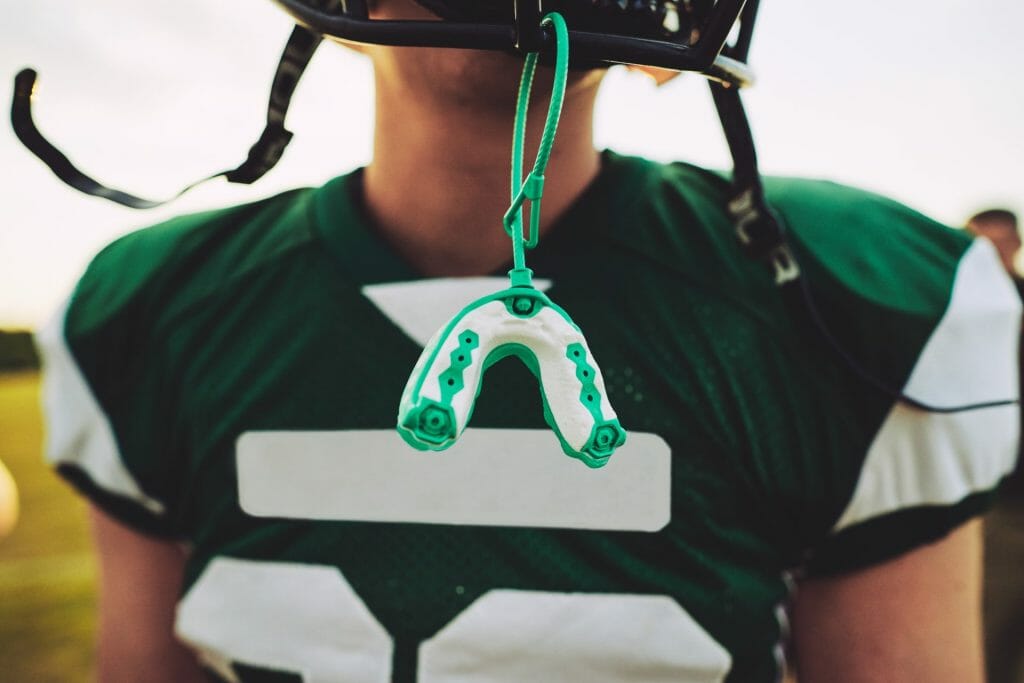Wearing a mouthguard is a beneficial way to protect your teeth and gums from trauma. It also serves as an aid in easing bruxism at night and treating TMJ.
Wearing one often, however, can lead to higher chances of stains developing and the growth of bacteria which can make the mouth guard smell, resulting in bad breath for you. Nobody wants either of these to happen, but when they do, there are things you can do to help.
Here are 10 tricks to stop those mouth guard stains and bad breath before they get the better of you.
1. Brush with Toothpaste (daily or after each use)
After removing your mouth guard, rinse it under cool water.
Apply a dab of a non-abrasive toothpaste to a soft-bristle toothbrush. Be sure to designate one toothbrush just for your mouth guard to avoid any bacterial cross-contamination.
Gently brush your mouth guard before rinsing, then set out to air dry.
2. Submerge in Mouthwash (daily or after each use)
Many mouthwashes contain antimicrobial properties, and this can be beneficial for cleansing your mouth guard and abating bad breath.
Fill a small container with one cap of mouthwash (alcohol-free), and place your mouth guard inside. Add water until it is fully submerged and let soak for approximately 30 minutes.
Remove, rinse again with cool water, then set out to dry.
3. Use Baking Soda Paste (daily or after each use)
Baking soda is an ingredient beneficial for many purposes, including reducing odors and removing debris and stains.
Start by combining equal measures of water and baking soda, mixing until a paste develops.
Dip a soft-bristle toothbrush into your paste and slowly and gently brush the mouth guard. Rinse thoroughly with cool water and let dry.
4. Clean with Soap and Water (daily or after each use)
You can use soap in place of toothpaste to clean your mouth guard. Just be sure to select a mild soap that is alcohol-free. Most antibacterial, Castille, and dish soaps are efficient and safe.
Remove and rinse your mouth guard to get started. Then apply soap directly to the mouth guard and gently brush until it is soapy. Rinse thoroughly and let dry.
5. Go Deeper with a Hydrogen Peroxide-White Vinegar Combination (monthly)
Hydrogen peroxide and vinegar are two natural ingredients found in most homes today and are options for caring for your mouth guard. The process involves soaking the night guard in one, followed by the other.
Start by rinsing the mouth guard under cool water. Prepare a clean glass and place the device inside. Pour vinegar in until it fully submerges the mouth guard. Let soak for up to 30 minutes.
Rinse both the glass and the nightguard. Place it back in the glass and fill with hydrogen peroxide. Let sit for 30 minutes. Remove, rinse, and let dry.
6. Deep Clean with Non-abrasive Denture Cleaner (monthly)
For a deep clean and removal of stubborn stains, consider using a non-abrasive denture cleaner. These cleaners usually contain an ingredient called sodium hypochlorite, which is essentially a safe chemical bleach. You can choose either tablet form or small packet powders. Try to avoid those denture cleaners with excessive fragrances or artificial dyes.
In a glass of warm water, drop in one tablet or pour the small packet of powder. Submerge your mouth guard in the liquid and let soak for between 5 and 10 minutes. (Follow the directions on the package for denture care). Rinse and let dry.
If the staining is excessive, you can follow up the soaking with brushing. Remove the mouth guard from the liquid soak and rinse under cool water. Instead of setting out to dry, take your toothbrush and dip in the glass of leftover solution. Gently brush the mouth guard, rinse, and let dry.
7. Use White Vinegar to Clear Calcium Deposits
What you may think is staining may actually be a build-up of calcium deposits. If whitish spots appear, use white vinegar to get rid of them.
Combine one cup of white vinegar and three cups of water in a container or glass. Place the mouth guard inside and leave it to soak for 15-30 minutes. Remove and scrub gently with your designated toothbrush to remove any leftover calcium. Rinse with cool water.
8. Clean the Mouth Guard Case
When not in use, your mouth guard will only stay as clean as the inside of the case itself. For this reason, clean your case at least weekly. You can use a gentle soap with water for this and occasionally do a deeper cleaning with hydrogen peroxide or vinegar.
Avoid storing the case in a high humidity environment such as the bathroom. Also, plan on replacing it every six to 12 months with a new one.
Always remember to let your mouth guard dry completely before placing it back inside its case.
9. Treat the Bad Breath Underlying the Mouth Guard
Bad breath (halitosis) is the result of bacterial build-up in the mouth. The bad smell can easily transfer to your mouth guard, increasing the odor emitting from your mouth.
To avoid this, practice good oral hygiene by brushing twice a day, flossing, and scheduling regular cleanings and dental exams with your dentist.
10. Take Your Mouth Guard and Case in for Deep Cleaning by Your Dentist
Whenever you have a scheduled dental checkup or cleaning, take your mouth guard with you and request a deep clean. Your dentist can also look for scratches in the device, which can contribute to staining and bacterial build-up. If found, it may be time for a replacement.
Even without scratches or damage, if bad breath while wearing the night guard continues, or staining or discoloration remains even after cleaning, it’s time to replace it with a new one.
Schedule Your Appointment with Linworth Family Dental Today
If you currently wear a mouth guard and have questions, contact the professionals here at Linworth Family Dental for answers. Whatever dental needs you have, we are here to help, so give us a call today to get started.



I liked your advice about using one toothbrush for the teeth and just one toothbrush for the mouth guards to avoid cross-contamination. I don’t fully understand how that works, but I’ll get a soft-bristled brush for the night guard. It might also be a good idea to ask the dentist for additional tips.